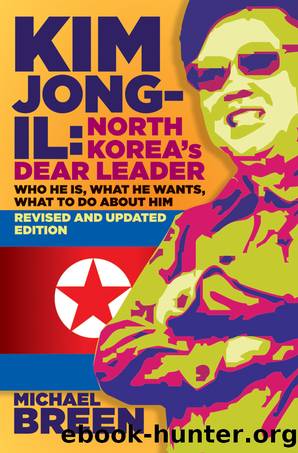Kim Jong-Il, Revised and Updated by Michael Breen

Author:Michael Breen
Language: eng
Format: epub
Publisher: Wiley
Published: 2011-11-03T16:00:00+00:00
Kim the Micromanager
Using Barber’s system of categorization, the evidence we have would strongly indicate that Kim Jong-il is an active leader. In fact, he comes across as almost overly so. On both of my visits to North Korea in official delegations, the host, Party Secretary Kim Yong-soon, made it very clear that Kim Jong-il was receiving personal reports of our trip. He personally gave Secretary Kim the go-ahead to let a CNN crew enter the country in April 1994.
“Kim Jong-il is very involved in everything,” says Shin Sang-ok, the kidnapped South Korean movie director. “He knows who’s traveling abroad, for example.”4
Kim Jong-il is a night owl, a habit he got from his father. According to a former bodyguard, Kim works in his office through the night and returns to his residence at dawn to sleep. He apparently only sleeps four hours a night and so is up before noon.5 When his father was alive, he would always phone while he was having brunch to check whether the Great Leader was up and about.6 The first time he took the kidnapped actress Choi Eun-hee to see a movie studio was at 2 a.m. When Choi said she would like to meet his sister, he ordered his aides to fetch her. It was after 1 a.m.
For exercise, he swims. He also rides horses, claiming that he’s been galloping eight kilometers a day at a speed of between 40 and 60 kilometers an hour since he was 11.7
Kim Jong-il seeks the advice of his associates more than his father did and makes decisions on the basis of discussion.8 Like his father, he can be ruthless with political enemies or people who cross him, but can be more forgiving of small errors and moral lapses. While Kim Il-sung operated through his strong control of aides and officials, Kim Jong-il stresses organizational management. Defectors say the younger Kim tends to maintain formal relations with the heads of government ministries and offices, while more frequently contacting their deputies. He prefers dealing with people individually than addressing groups. Interestingly, while reluctant to make public addresses, Jong-il is by all accounts a great talker in private meetings once he gets inspired.
His source of legitimacy—his father—is also his greatest obstacle. Jong-il palpably lacks both the charisma and the heroic resume of Kim Il-sung. This may to some extent explain the secretive style in that it allows him to conceal his shortcomings, come across as modest, and, most importantly, maintain the presence of his father’s spirit in his own leadership. His rule is, in fact, characterized by the notion, “The Great Leader is always with us.”
As an absolute leader, Kim Jong-il needs to be careful to avoid being associated with failure. In 1996, at the height of the famine, he indicated in speeches that economic management was the responsibility of other officials. But, then, in a conversation with visiting Japanese-Koreans in 1998, he demonstrated that he was clearly in charge. He noted, for example, that while the Chinese would buy
Download
This site does not store any files on its server. We only index and link to content provided by other sites. Please contact the content providers to delete copyright contents if any and email us, we'll remove relevant links or contents immediately.
Einstein: His Life and Universe by Walter Isaacson(1992)
Finding Freedom: Harry and Meghan and the Making of a Modern Royal Family by Omid Scobie & Carolyn Durand(1372)
Promised Land (9781524763183) by Obama Barack(1328)
Finding Freedom by Omid Scobie(1276)
Compromised by Peter Strzok(1252)
JFK by Fredrik Logevall(1139)
Freedom by Sebastian Junger(843)
The Russia House by John Le Carré(811)
Salford Lads: The Rise and Fall of Paul Massey by Bernard O'Mahoney(756)
The Irish Buddhist by Alicia Turner(744)
Day of the Dead by Mark Roberts(741)
Kremlin Winter by Robert Service(706)
Graveyard (Ed & Lorraine Warren Book 1) by Ed Warren & Lorraine Warren & Robert David Chase(699)
A World Ablaze by Craig Harline(691)
Joe Biden: American Dreamer by Evan Osnos(660)
Flying Tiger by Samson Jack(654)
100 Things Successful Leaders Do by Nigel Cumberland(633)
Melania and Me: The Rise and Fall of My Friendship With the First Lady by Stephanie Winston Wolkoff(631)
The Mission by David W. Brown(620)
